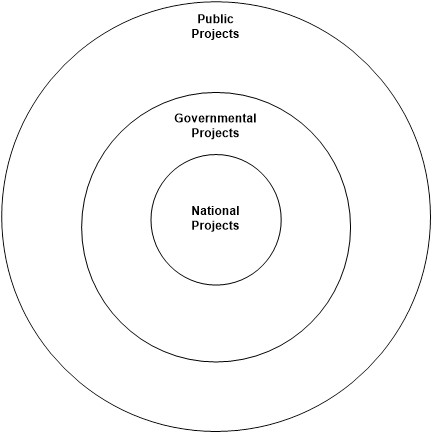Introduction to a new Series
SERIES ARTICLE
By Stanisław Gasik, PhD
Warsaw, Poland
“The most significant disruption of the 21st century (…) is the way organizations and COUNTRIES will be managed – through projects,” says Antonio Nieto Rodriguez (2022), one of the most influential contemporary thinking leaders.
So, countries – and their governments – need specific knowledge of project management. They should use this knowledge to improve the implementation of projects in their dependent organizations.
The Public Sector
A specific set of organizations are those which are subordinated – in different ways – to the government. Government is the parliament, responsible for all regulations in the state, and the cabinet, responsible for the implementation of these regulations and the efficient functioning of the state as a whole. The cabinet is made up of ministers who are responsible for their ministries (also called departments) and, through them, for certain areas of the state functioning. Ministries (and sometimes parliaments and cabinets as a whole) have their own agencies with specific tasks. For example, the control of medicines, companies’ registration, or railway lines’ development and maintenance. Ministries or agencies, in turn, can create specialized enterprises that perform specific activities. For example, road construction companies, hospitals, or railway companies. Enterprises whose main goal is to generate profit can also be created. For example, a state post office may set up a courier company. After all, state institutions can buy shares in listed companies (or hold shares in partially privatized state-owned companies).
In federal states, similar structures may exist for both the central level and the constituent states. In addition, local governments, which may have their own structure and subordinated organizations of various types, operate autonomously.
This is the public sector.
The size, structure, and scope of operation of the public sector in each country are specific and result from its constitution, tradition, culture, environmental conditions, politics, and possibly other factors. Governments influence organizations from other sectors in other ways: by laws, norms, other regulations, contracts, financial incentives, etc.
Public Projects
Projects in which organizations from the public sector take part in management (not necessarily fully manage them) are called public projects. The most important of them may remain under the special supervision of government institutions. Such projects may be called in various ways like government projects or major projects (e.g., UK IPA, 2020). In turn, the most important government projects are national projects that may have legally defined priorities (e.g., NSW Parliament, 2021). The main role of governments is to create conditions (regulations, structures, processes…) for the effective implementation of public projects in their jurisdictions.

Figure 1. Categories of public projects
Governments have the potential to influence, regulate, or enforce project management practices in their public projects – at least in parts for which they are accountable. But some governments literally do nothing about project management. They just invest some money, are not interested in the way projects are managed, and expect outputs and results from their projects. On the opposite end, there are governments that have well-defined project management procedures and mechanisms for their continuous improvement.
More…
To read entire article, click here
Editor’s note: This article is the first in a series related to the management of public programs and projects, those organized, financed and managed by governments and public officials. The author, Dr. Stanisław Gasik, is the author of the book “Projects, Government, and Public Policy”, recently published by CRC Press / Taylor and Francis Group. That book and these articles are based on Dr. Gasik’s research into governmental project management around the world over the last decade. Stanisław is well-known and respected by PMWJ editors; we welcome and support his efforts to share knowledge that can help governments worldwide achieve their most important initiatives.
How to cite this paper: Gasik, S. (2023). Let’s talk about public projects, series article, PM World Journal, Volume XII, Issue I, January. Available online at https://pmworldlibrary.net/wp-content/uploads/2023/01/pmwj125-Jan2023-Gasik-lets-talk-about-public-projects.pdf
About the Author

Stanisław Gasik, PhD, PMP
Warsaw, Poland
![]()
Dr. Stanisław Gasik, PMP is a project management expert. He graduated from the University of Warsaw, Poland, with M. Sc. in mathematics and Ph. D. in organization sciences (with a specialty in project management). Stanisław has over 30 years of experience in project management, consulting, teaching, and implementing PM organizational solutions. His professional and research interests include project knowledge management, portfolio management, and project management maturity. He is the author of the only holistic model of project knowledge management spanning from the individual to the global level.
Since 2013, his main professional focus has been on public projects. He was an expert in project management at the Governmental Accountability Office, an institution of the US Congress. He is the author of “Projects, Government, and Public Policy,” a book that systematizes knowledge about government activities in the area of project management.
He was a significant contributor to PMI’s PMBOK® Guide and PMI Standard for Program Management and contributed to other PMI standards. He has lectured at global PMI and IPMA congresses and other international conferences.
His web page is www.gpm3.eu









